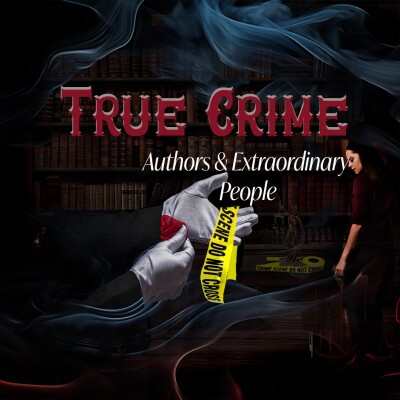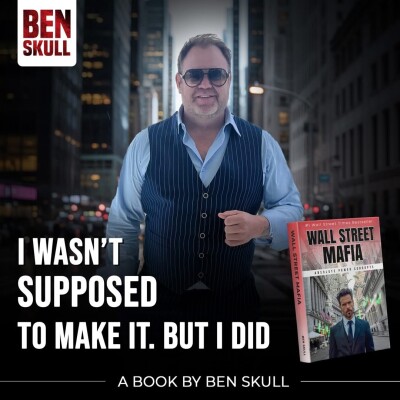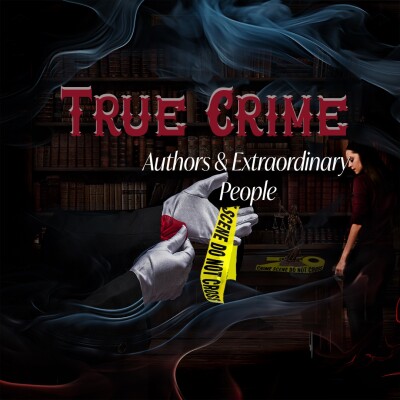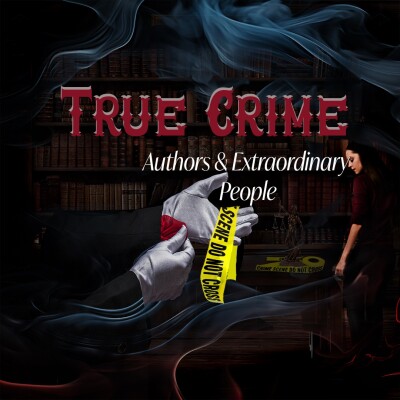Speaker #1What's going on everybody and welcome to another episode of True Crime, Authors and Extraordinary People. Of course, I'm your man. David McClam, hey, if you guys haven't already, make sure you follow us on all of our social media. One link to a link tree will get you every place you need to go pertaining to the show. And as I always like to remind you, if you are someone or you know someone who feels like you want to hurt yourself or others, please leave this episode and dial 988. It is the suicide prevention hotline. You can call or text them. They will be able to get you the help that you need because of no one else has told you this today. Let me be the first to tell you that I do care and I do need you to be here. Also, if you'd like to support the show, you could do so by crowd weave. I'm still working on that. So we've been there. Go back and check us out. Crowd weave would be. List it in the show notes. It is a fun way for me to give back to you for helping support the show. Also, if you'd like to buy me a coffee, you also find that link in the show notes as well. And you can do that for as low as one dollar. All right, well, let's jump into today's case. It is a gripping one. As far as I am concerned, it is one I have been wanting to talk about for the longest period of time. because it is something that needs to be talked about. So today we are going to talk about prison reform. Now, I'm sure that you know this, or you may even agree with me, that this is a critical issue and it affects millions of people all over our country. So specifically, we're going to explore what's happening in my own state, right here in California, and how it compares to national trends. We'll also examine policies, statistics, and the voices advocating for change. Now, everybody will tell you that in many other topics that people follow California because California is the strictest state as far as rules go. I remember years ago when I was in trucking, they always said if we follow California's guidelines for trucking, we will always know that we are where we're supposed to be. So to me, that means if everybody looks to us for a lot of that, then also prison reform may be worse here. And maybe this will be the start and set that example. So buckle in, because this is an episode that you don't want to miss. And as always, if you love what we're doing here, don't forget to subscribe and leave us a review. So let's get started. Let's start by looking at the big picture. California has one of the largest prison populations in the United States. As of 2023, there were about 95,000 inmates in state prisons, which is a significant decrease from the peak of nearly 165,000 in 2006. This reduction is largely due to policy changes aimed at reducing mass incarceration. In 2011, the U.S. Supreme Court ruled in Brown v. Plata that California's overcrowded prisons violated the Eighth Amendment's prohibition against cruel and unusual punishment. This forced the state to take action, leading to initiatives like realignment under Assembly Bill 109, which shifted many inmates from state prisons to county jails. But however, despite these efforts, California still faces serious challenges, including racial disparities, high recidivism rates, and questions about the effectiveness of rehabilitation programs. The state's recidivism rate, meaning the percentage of people who reoffend and return to prison, has historically hovered around 50%, though recent reforms aim to lower that number. So now let's talk about some of the key prison reform efforts in California over the last decade. So Proposition 47, which is the 2014 bill, reclassified certain nonviolent felonies such as drug possession and petty theft as misdemeanors, and as a result, thousands of inmates were released or had their sentences reduced. Then we have Proposition 57 in 2016, which allowed parole consideration for nonviolent offenders and gave prisoners more opportunities to earn credits for good behavior and education programs. Then we have Bill 1391 in 2018, which prohibited minors under 16 from being tried as adults, reflecting a shift toward juvenile justice reform. And then there was Bill 2147 in 2020, which allowed formerly incarcerated firefighters to have their records expunged so they could pursue firefighting careers post-release. Former Governor Jerry Brown was a major advocate for many of these policies, stating, and I quote, We have to move from retribution to rehabilitation if we want to truly fix our justice system. End quote. His words highlight the philosophy. behind these changes. Now let's zoom out and look at the national landscape. So you see the United States has the highest incarceration rate in the world. We have over 1.8 million people behind bars as of recent estimates. However, reforms are happening nationwide. So see the First Step Act of 2018. This federal law aimed to reduce recidivism by expanding. early release programs and reducing mandatory minimum sentences for certain offenses. Then we had the bail reform. States like New York and New Jersey have made efforts to eliminate cash bail for nonviolent offenses, preventing pretrial detention for people who simply can't afford to pay. And I hate to say it, but of course, that bail reform in the people who can't afford to pay is often minorities. African-American, Latinos, Asians across the board. Historically, that has proven to be true. Then we have restorative justice programs. Cities across the U.S. are implementing alternative sentencing programs, emphasizing rehabilitation over punishment. And then there's sentencing reforms. More states are moving away from harsh mandatory minimum sentences. particularly for drug-related offenses. Bryan Stevenson, the author of Just Mercy, has spoken extensively about the need for reform, stating, and I quote, The opposite of poverty is not wealth. The opposite of poverty is justice. End quote. His perspective challenges the way we think about crime and punishment in America. But of course, prison reform is not without controversy. See, some critics argue that some policies like Proposition 47 have led to an increase in property crimes. Others worry about the impact of reducing cash bail, fearing that more offenders will commit crimes while awaiting trial. On the other hand, supporters emphasize that mass incarceration has devastated communities, especially communities of color, and that rehabilitation and education programs are the key to reducing crime long term. Senator Cory Booker, a strong advocate for reform, once said, and I quote, we cannot incarcerate our way to safety. True justice comes from addressing the root causes of crime, end quote. This perspective underscores the shift in policy thinking across the country. Now, looking ahead, there are several key issues to watch. The future of private prisons. Some states have begun phasing them out, but they still house a significant portion of inmates. Sentence and reform. Will lawmakers continue reducing harsh sentences, especially for nonviolent offenses? Rehabilitation programs, more investment in education and job training could be the key to breaking the cycle of incarceration. Juvenile justice reform. Many advocates are pushing for changes to how young offenders are treated, emphasizing rehabilitation over punishment. Now, this may be a controversial statement for me, but I do believe that there are some crimes, depending on that age, I'm going to say at least 13 or 14 up, that I do feel that a juvenile should still be tried as an adult. I think because there's been some laws and rightfully so that has tried to reduce the amount of jail time that a child could get, depending on the offense. I do agree. Some of those are too long. But let's just take, for instance, murder. If you go out at 14 and you murder somebody, you're 13, you know what you are doing at this point. And you know what that would bring. I think depending on the case and the violence of that case, maybe that case still should be tried as an adult. But that is just my opinion. Michelle Alexander, author of The New Jim Crow, argues that mass incarceration is a modern form of racial and social control, stating in our quote. We have not ended racial caste in America. We have merely redesigned it. End quote. Her work continues to influence policy discussions nationwide. Conversation around prison reform is complex, but one thing is clear. Change is happening. Whether we agree with all of the reforms or not, it's important to stay informed and engage in the discussion. What do you guys think about prison reform? Do you think that we need to reform it or do you think the prison system is fine the way that it is? I can tell you from living here in California, where we have the largest prison population in the United States, that it is time to reform prisons. It is time to look at some of these laws and it is time to make incarceration fair for everyone involved. So thank you guys for tuning in for this one. If this episode made you think, share with a friend and don't forget to subscribe so you never miss an episode of True Crime Authors and Extraordinary People. So I hope that something grabbed you with this one and I hope that you will help push for the reform of prisons all over the United States. And it's time that we do that. It's time we make this system fair for everyone and that everyone can stand on. even ground. Let's go ahead and get some of the education out there because I do believe that that is the reason why we have such a high recidivism rate. It's because you let these guys and girls out of prison that's been locked up for 5, 10, 15, 20 years. The world has changed and they don't know how to change. So we can prepare them while they're incarcerated. What they're looking at when they get out of jail, I do personally believe that there would be less We Offenders in the world. Thank you once again for joining me today. I know you have many choices in true crime and interview podcasts. I am just grateful that I am one of your choices. Remember, you have been listening to the only three faceted podcast of its kind. Be good to yourself and each other. And always remember, always stay humble. An act of kindness can make someone's day. A little love and compassion can go a long way. And remember that there is an extraordinary person in all of us. I'll catch you guys on the next one.





